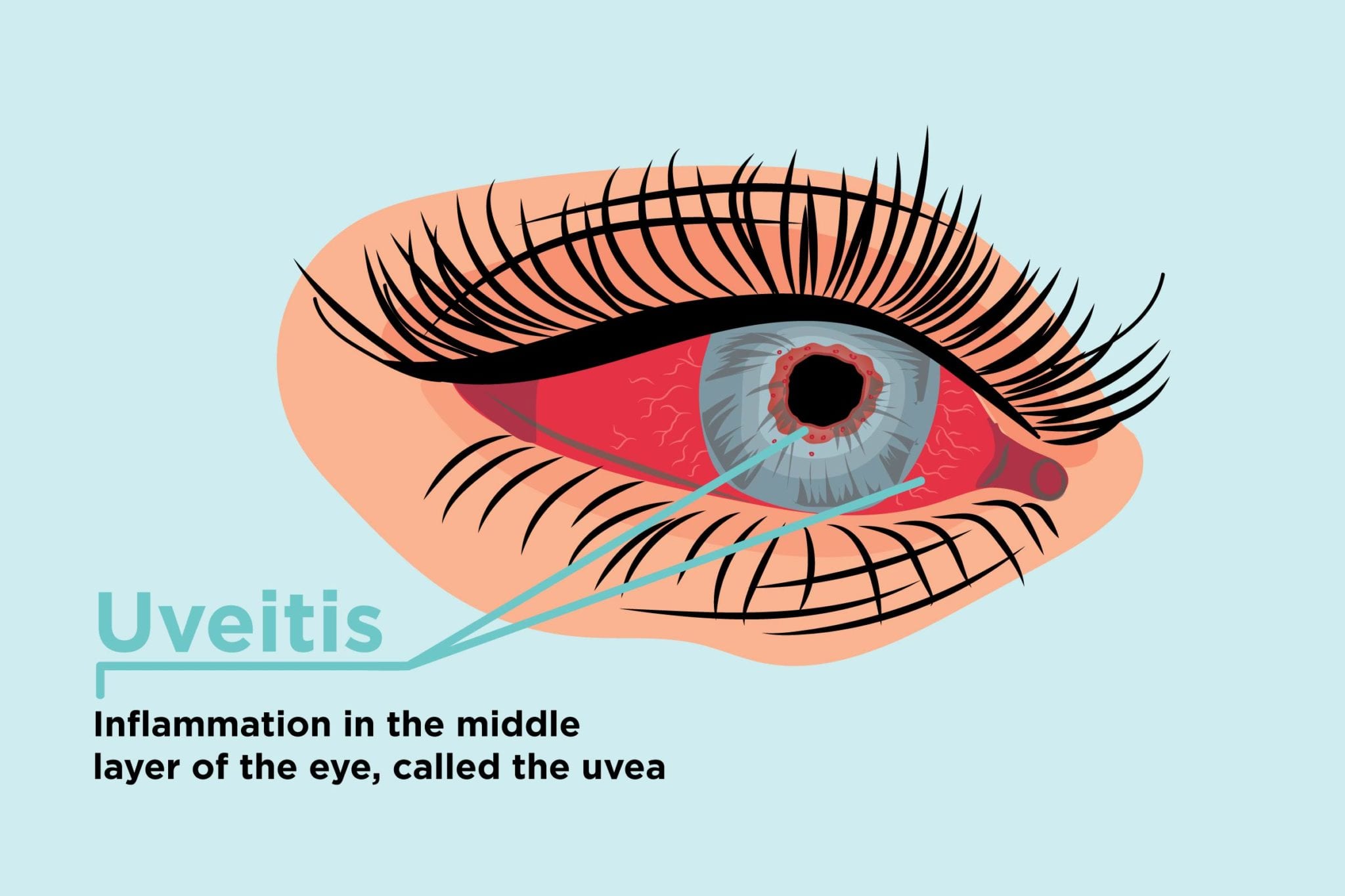What Is Uveitis?
Uveitis is a medical condition that involves inflammation of the uvea, the middle layer of the eye. The uvea includes important structures such as the iris, ciliary body, and choroid, all of which are critical for maintaining healthy vision. Inflammation in this area can cause discomfort, visual disturbances, and, if untreated, serious complications like glaucoma, cataracts, or retinal damage.
Types of Uveitis:
Uveitis is classified based on the part of the eye that is affected:
- Anterior Uveitis: Inflammation of the front part of the eye, including the iris.
- Intermediate Uveitis: Inflammation of the middle part of the eye, primarily affecting the vitreous gel.
- Posterior Uveitis: Inflammation in the back of the eye, involving the retina and choroid.
- Panuveitis: Inflammation that affects all layers of the uvea.
Uveitis may occur suddenly or develop gradually and is often linked to underlying health conditions like autoimmune diseases, infections, or trauma.
Why Choose India for Uveitis Management?
India is a globally recognized hub for advanced medical care, offering comprehensive Uveitis management at highly competitive rates.
Benefits of Uveitis Treatment in India:
- Expertise in Ophthalmology: Renowned eye specialists with years of experience in managing Uveitis cases.
- State-of-the-Art Technology: World-class diagnostic tools such as optical coherence tomography (OCT), fluorescein angiography, and high-resolution imaging.
- Affordable Costs: Treatments in India cost significantly less than in Western countries without compromising on quality.
- Multidisciplinary Care: Collaborative approach involving rheumatologists, infectious disease specialists, and ophthalmologists for holistic treatment.
- Internationally Accredited Hospitals: Many Indian hospitals are JCI and NABH accredited, ensuring high standards of care.
- Customized Treatments: Tailored treatment plans to address individual needs and underlying conditions.
Common Causes of Uveitis
Understanding the root cause of Uveitis is crucial for effective treatment. Some common causes include:
- Autoimmune Disorders: Conditions like rheumatoid arthritis, ankylosing spondylitis, Behçet's disease, and sarcoidosis often trigger Uveitis.
- Infections: Bacterial (tuberculosis, syphilis), viral (herpes simplex, cytomegalovirus), fungal, or parasitic infections can lead to inflammation.
- Trauma or Injury: Eye injuries from accidents or surgeries may cause Uveitis.
- Systemic Diseases: Conditions like lupus or inflammatory bowel disease (IBD) are sometimes linked to Uveitis.
- Idiopathic Cases: In about 30–50% of cases, the cause remains unknown.
Symptoms of Uveitis
The symptoms of Uveitis may vary depending on the type and severity of the condition.
Common Symptoms:
- Persistent redness and pain in the eye
- Blurred or reduced vision
- Sensitivity to light (photophobia)
- Floating spots or shapes in vision (floaters)
- Headaches or discomfort around the eye
- Swelling of the eyelids or surrounding tissues
Early recognition of these symptoms is essential to prevent complications and preserve vision.
How Is Uveitis Diagnosed?
Timely and accurate diagnosis is critical to determine the appropriate course of treatment.
Diagnostic Procedures Include:
- Comprehensive Eye Examination: A slit-lamp examination helps detect inflammation in different parts of the eye.
- Imaging Tests:
- Optical Coherence Tomography (OCT): Provides detailed imaging of the retina.
- Fluorescein Angiography: Detects retinal inflammation and blood vessel leakage.
- Blood Tests: To identify infections, autoimmune markers, or systemic diseases.
- Chest X-Ray or CT Scan: Helps diagnose conditions like sarcoidosis or tuberculosis.
- Lumbar Puncture or Biopsy (Rare Cases): May be needed to confirm underlying infections or diseases.
Advanced Uveitis Treatments in India
India provides a range of cutting-edge treatment options for managing Uveitis effectively.
Non-Surgical Management:
- Corticosteroids:
- Eye drops for anterior Uveitis.
- Oral or injectable steroids for intermediate or posterior Uveitis.
- Immunosuppressive Drugs:
- Medications like methotrexate or cyclosporine for autoimmune-related Uveitis.
- Antibiotics/Antivirals:
- Target infections causing Uveitis, such as tuberculosis or herpes.
Surgical Treatments:
- Vitrectomy:
- Removes the vitreous gel and clears inflammation in severe posterior Uveitis.
- Intravitreal Injections:
- Delivers steroids or anti-VEGF drugs directly to the eye for targeted therapy.
- Laser Surgery:
- Treats complications like retinal detachment or macular edema.
Post-Treatment Care for Uveitis
Managing Uveitis effectively requires ongoing care even after treatment.
Steps for Post-Treatment Care:
- Regular use of prescribed medications to prevent flare-ups.
- Periodic eye exams to monitor progress.
- Maintain a healthy lifestyle to reduce triggers for autoimmune conditions.
- Protect your eyes from injury and infections.
- Report any recurrent symptoms to your doctor immediately.
Cost of Uveitis Treatment in India
India offers world-class Uveitis care at affordable prices.
Estimated Costs:
- Eye Examination: ₹2,000 – ₹5,000 (Approx. $25 – $65)
- Corticosteroid Eye Drops: ₹500 – ₹2,000 (Approx. $10 – $30)
- Vitrectomy Surgery: ₹60,000 – ₹1,00,000 (Approx. $750 – $1,200)
- Intravitreal Injections: ₹10,000 – ₹25,000 (Approx. $125 – $300)
Why Choose Healtour Solutions?
At Healtour Solutions, we specialize in connecting patients with the best Uveitis experts and hospitals in India.
Our Comprehensive Services Include:
- Personalized guidance to find top specialists and facilities.
- Assistance with travel, accommodations, and hospital arrangements.
- Transparent cost breakdowns to avoid hidden fees.
- Dedicated support for follow-up care and long-term management.
- Multilingual assistance for international patients.
FAQs About Uveitis Management
- Can Uveitis cause permanent vision loss?
Yes, if left untreated, Uveitis can lead to complications like glaucoma, cataracts, or retinal damage, which may result in vision loss. Early diagnosis and timely treatment are crucial.
- Is Uveitis curable?
While Uveitis can often be managed effectively, the underlying cause may not always be curable. Regular treatment and follow-up help prevent recurrence and complications.
- What are the early warning signs of Uveitis?
Symptoms include eye redness, pain, blurred vision, light sensitivity, and floaters. Seek immediate medical attention if these symptoms appear.
- What causes Uveitis to recur?
Recurrence is common in autoimmune-related or idiopathic Uveitis. Triggers like infections or stress can also cause flare-ups, requiring ongoing care.
- Can children develop Uveitis?
Yes, Uveitis can affect children, often linked to juvenile idiopathic arthritis (JIA). Pediatric Uveitis requires specialized care to prevent complications.
- How is Uveitis different from conjunctivitis?
Uveitis affects the uvea (inside the eye) and can damage vision, while conjunctivitis involves the outer eye surface and is less severe. Both require distinct treatments.
- How long does Uveitis treatment take?
Treatment duration depends on the severity and type of Uveitis. It can range from a few weeks to months, with some cases requiring long-term management.
- Can lifestyle changes help manage Uveitis?
Yes, maintaining a healthy diet, managing stress, and avoiding smoking can support eye health and reduce triggers, especially in autoimmune-related cases.
- Are Uveitis treatments painful?
Most treatments, like eye drops or injections, cause minimal discomfort. Advanced surgical procedures are performed under anesthesia to ensure patient comfort.
- Do I need to see a specialist for Uveitis?
Yes, Uveitis requires an ophthalmologist or a Uveitis specialist for accurate diagnosis and treatment. Early specialist care can prevent severe complications.



